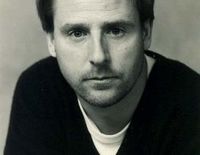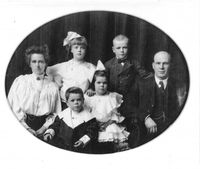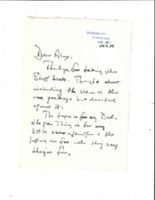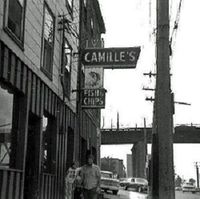Alex Pugsley Gets to the Heart of Halifax in His Debut Novel
In certain stories, the setting itself becomes a character, containing all the rich history and moody dynamics of the people who occupy it. Such is the case with Alex Pugsley's debut novel Aubrey McKee (forthcoming from Biblioasis), a coming-of-age tale set in Halifax, Nova Scotia which sets the city's unique charm against the much grimier-underbelly of adolescent life.
Aubrey and his companions stumble through their teen years in the Maritime port city, encountering a bizarre cast of characters including drug-dealing rich kids, troubled runaways, ex-pat surgeons, and more. As Aubrey and company mature, the true nature of the place they call home begins to emerge into focus, forcing a reckoning with the mythology of their past and the eye-opening reality of their present.
We're thrilled to have Alex at Open Book today, where he discusses the ten-year process that began Aubrey McKee, the difference between healthy and unhealthy coping mechanisms, and the "lookbook" he created to develop the specific mood and style his novel required.
Editor's note: While Aubrey McKee is a work of fiction, the novel is written in the style of a memoir. Thus, Alex Pugsley chose to do our "My Story: Memoir" interview.
Open Book:
How did your memoir project first start? Why was this the right time to tell your story?
Alex Pugsley:
This novel, told in the form of a memoir comprised of connected short stories, began when I was 25, the same age as the narrator at the end of the book. I wanted to write about Halifax, and I wanted to write about Karin Friday, Gail Benninger, and Cyrus Mair. But I wanted to be true to my conception of these characters — and to the coherences they implied. In order to build up my confidence, I started slowly. I published one chapter a year for about ten years — chapters that were peripheral to the central drama — and it was only after this early work got published that I felt secure enough to take on writing what were for me the central and critical chapters regarding Karin, Gail, and Cyrus.
OB:
Is there a question that was central to this project? And if so, did you know the question when you started writing or did it emerge from the writing process?
AP:
I’m not sure there’s one question that is central to this project. But I’d say there is a central concern. A kid has many more thoughts and feelings than he or she has ways of expressing them. In my childhood, I was aware of many opinions, possibilities, and feelings, but I often felt at a loss to express or explain them. My hope was that if I wrote a novel about Halifax, I might better communicate the things I sensed so that by the end, when the narrator says, “this was Halifax as I knew it, as I lived it and felt it,” readers will feel the narrator has earned the right to say that.
OB:
Did your memoir change significantly from when you first started working on it to the final version? Was there anything that surprised you about the process?
Your CanLit News
Subscribe to Open Book’s newsletter to get local book events, literary content, writing tips, and more in your inbox
AP:
Oh, sure. I thought the novel was going to take place all over Canada, Mexico, Cambridge, and Eastern Europe. Early versions had sequences in Cabo San Lucas and Bratislava. It was only when I understood that everything should happen in Halifax that things began to click into place.
OB:
What do you do if you’re feeling discouraged during the writing process? Do you have a method of coping with the difficult points in your projects?
AP:
This is a great question and I’m glad you asked it. There are times when you work on a project and you do everything right — good idea, good attitude, good discipline — and the project works out. Then there are other times, when you do things in the same way and — for whatever reason — the project falls apart. In these situations, it’s easy to feel sorry for yourself, it’s easy to become angry or depressed, and it’s easy to turn to drinking or other kinds of substance abuse. Learning to respond to rejection and failure in (what will become) constructive ways is crucial. For anybody, not just a writer. Exercise, getting outdoors, eating and sleeping right, and talking with someone you trust about what’s happening to you — those have helped me immensely.
OB:
Did you use any materials, documents, interviews, or other research that became part of the writing process?
AP:
I made use of all kinds of materials — documents, photographs, personal letters — in the research and writing of Aubrey McKee. I’ve worked as a filmmaker, and when you pitch a film you often put together a lookbook to convey the style, vibe, and design of the movie. In the writing of this book, I did something similar, compiling different visual clues to help me imagine my way into the story.
The Mairs, Cyrus’s family, are an archaic Halifax family, described like so: “I think of old-time men like Titus Mair and Samuel Cunard and Alexander Keith as figures in a heroic drama, ranting and roaring about Hollis Street, representatives of Nova Scotia at the acme of its existence as a self-governing colony within the British Empire.” To conjure that Nova Scotia, and because a sense of history is one of the book’s major themes, I collected stamps, bank notes, and random family photographs from that era, images of which I attached with this interview. I used such references to orient myself in the world of the Mairs.
I also looked through my own correspondence, letters I’d written and letters I’d received, such as the one sent by a friend from Peterhouse, Cambridge, which served as a spur for one of the signature letters in the book.
Pinned up above my desk were photographs suggestive of time and place, such as the attached 1970s street scene of Camille’s Fish & Chips — that’s from a chapter that was published in Taddle Creek but cut from the finished book — as well as this image of the sea just before a hurricane — that’s for the chapter that serves as the novel’s final sequence.
OB:
What stands out to you and makes a really great book? Were there any published memoirs or novels you found inspiring structurally or otherwise while working on yours?
AP:
A number of books — novels, story collections, and memoirs — written in first-person were very helpful to me. I have mentioned elsewhere how Alice Munro’s Lives of Girls and Women, Margaret Laurence’s A Bird in the House, and Mordecai Richler’s The Street were important models. So were Fifth Business and Great Expectations. So were the Patrick Melrose novels and Proust’s À La Recherche Du Temps Perdu. All of those, of course, are works of fiction. Memoirs most magical for me have been Nabokov’s Speak, Memory, Thurber’s My Life and Hard Times, and Blixen’s Out of Africa. Let me also add Maxine Hong Kingston’s The Woman Warrior because it’s one of Gail’s favourite books and, if this were Gail’s interview, she’d make that memoir a priority.
(Should you want to read about Gail, here’s a link to the chapter, “Gail in Winter,”
https://tnq.ca/story/gail-in-winter/, recently included in a round-up of short stories on the CBC website by author Kevin Hardcastle.)
OB:
What are you working on now?
AP:
After Aubrey McKee, I’m doing a story collection called Shimmer, so I’m in the middle of finishing that. Two stories from the book come out in journals this month: “Turnaround” in the Spadina Literary Review and “Twyla” in Canadian Notes & Queries.
_________________________________________________________________________________________________
Alex Pugsley is a writer and filmmaker originally from Nova Scotia. A winner of the Writers’ Trust Journey Prize, his fiction has appeared in Brick, The Dalhousie Review, Eighteen Bridges, The New Quarterly, subTerrain, Taddle Creek, This Magazine, The Walrus, and, for the last three years, Best Canadian Stories. His next book, Shimmer, is forthcoming from Biblioasis.







